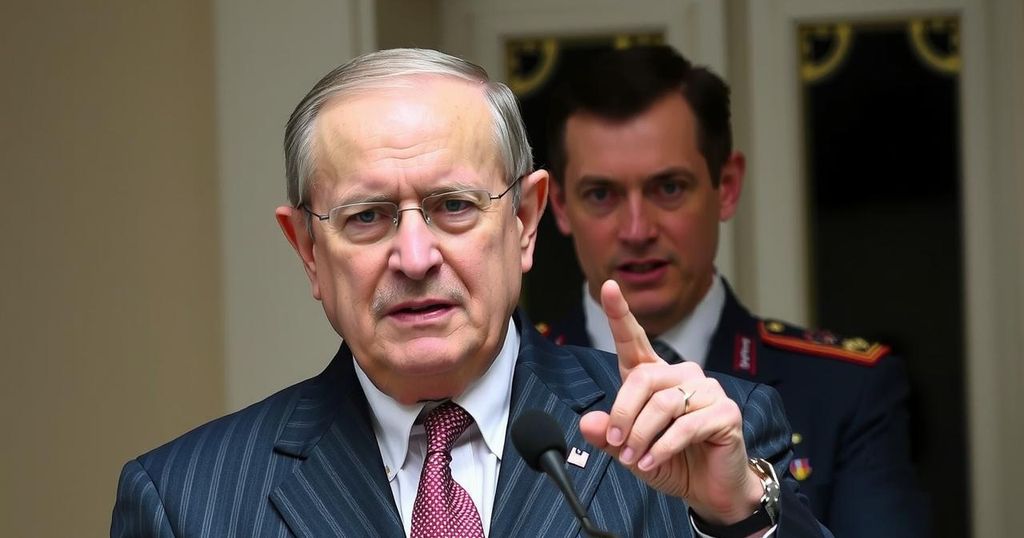Implications of Assad’s Fall: A Setback for Russian Prestige
The fall of Bashar al-Assad poses a serious blow to Russia’s prestige, undermining its military investment in Syria. Reports indicate Assad has sought asylum in Moscow, leading to concerns regarding the future of Russian military bases in the region. State media has begun to shift blame to the Syrian military for the regime’s collapse, while the Kremlin emphasizes national security amid ongoing challenges in Ukraine.
Recent developments in Syria have resulted in a significant blow to Russia’s standing on the global stage. For almost ten years, Russian military support was instrumental in maintaining Bashar al-Assad’s regime. However, the unexpected and rapid downfall of Damascus has brought this situation to a head, compelling Assad to seek refuge in Moscow. Russian news reports indicate that the Kremlin has granted asylum to Assad and his family on “humanitarian grounds.” This unraveling of Russia’s investment in Syria has raised serious questions regarding the future of its military presence and base operations in the region.
Following these events, the Russian foreign ministry released a statement expressing deep concern over the dramatic changes in Syria. The fall of Assad represents not only a tactical defeat but also a significant setback for Russia’s ambitions to re-establish its status as a formidable global power. When Russian forces intervened in 2015, it was seen as a strategic move to counter Western influence in the region. Previously, President Putin even celebrated supposed victories in Syria, underscoring the notion that Moscow was solidifying its foothold in the Eastern Mediterranean.
The alliance with Syria provided Russia with critical naval and air military bases, facilitating its operations and influence across the region and into Africa. As such, a pressing question looms over the fate of the established bases in light of the regime’s collapse. The Kremlin has indicated that it remains in communication with Syrian opposition forces, who have purportedly assured the security of Russian assets in the area. Despite claims of no immediate threats, the precarious situation reflects Russia’s vulnerability moving forward.
Moreover, Russian state media has begun highlighting faults within the Syrian military, suggesting that the army’s lack of resistance against rebel forces contributed to this upheaval. Anchor Yevgeny Kiselev noted, “But in Aleppo, for example, positions were given up virtually without a fight,” shifting the responsibility away from Russian support and reinforcing Moscow’s narrative of strategic priorities, primarily focusing on national security amidst ongoing struggles in Ukraine. This context serves a dual purpose, indicating a pragmatic shift in Russian political communication.
In summary, the fall of Assad poses significant implications for Russia’s military strategy and geopolitical influence in the Middle East. The Kremlin’s attempts to frame this disaster as a manageable issue indicate a struggle to maintain a façade of control while facing overwhelming changes. Therefore, while Russia attempts to redirect attention towards domestic security, the loss of its most steadfast ally in the region will undoubtedly resonate as a monumental setback.
The article details the recent downfall of Bashar al-Assad’s regime in Syria and discusses its implications for Russia’s international standing. Russia has been heavily invested in supporting Assad amidst a prolonged civil war, with military involvement that marked a critical strategy to reassert its influence beyond the post-Soviet sphere. The dramatic shift in power dynamics raises concerns regarding Russian military bases in Syria and challenges the narrative of Russian effectiveness in the region.
In conclusion, the abrupt fall of Bashar al-Assad’s regime marks a pivotal moment for Russia, undermining years of military and diplomatic investment. This event stretches beyond regional implications, affecting Russia’s global prestige and power dynamics. As the Kremlin navigates this tumultuous landscape, adapting its narrative and focusing on national priorities will be paramount in managing public perception and maintaining its strategic interests.
Original Source: www.bbc.co.uk




Post Comment